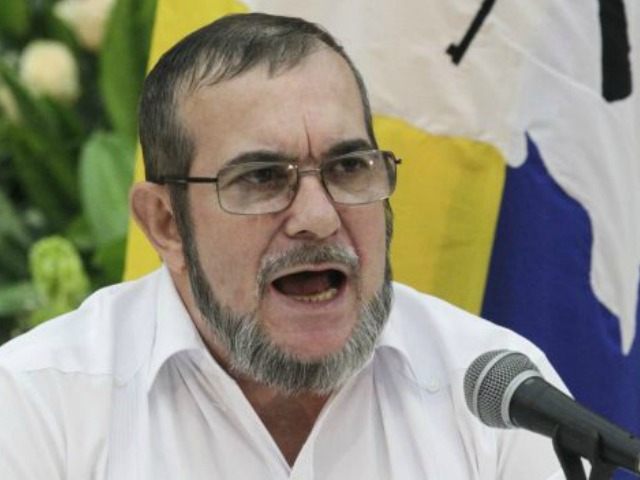In an interview with BCC, Colombian President Juan Manuel Santos objected to the idea of helping the United States extradite the leader of the Revolutionary Armed Forces of Colombia (FARC), a Marxist terrorist group responsible for years of drug trafficking and violence that have affected American citizens.
“That $5 million reward is going to have to disappear, because I am not extraditing him,” Santos told the BBC regarding Rodrigo Londoño, a terrorist known by the alias “Timochenko” who currently runs the FARC out of Havana, Cuba. Timochenko is wanted for a variety of crimes regarding the trafficking of drugs across Latin America and into the United States. It is estimated that the FARC’s death toll since its founding in 1964 is upwards of 200,000 people, not including the missing.
Santos, who has been negotiating a peace deal with the terrorist group for three years, decried the potential imprisonment of the terrorist leader as “absurd.” “Can you imagine a guerrilla leader negotiating a peace process that ends in a life sentence in the Uinted States?” He added that “the United States has been by my side during the whole process and they know I will not extradite these people if we reach a peace agreement.”
The United States and Colombia have a rich history in cooperating against the terrorist group. Operations aided by the CIA under Presidents George W. Bush and Álvaro Uribe resulted in the destruction of much of the group’s infrastructure, as the Colombian military used American counterterrorism strategies being employed in the Middle East to eliminate most of the group’s leadership. Those who survived, like Timochenko, fled to Cuba, then still considered a state sponsor of terrorism. Despite not abandoning any of its activities in support of terrorist group like the FARC and Shiite terror group Hezbollah, President Barack Obama removed Cuba from the state sponsors of terrorism list earlier this year.
Santos expressed confidence in his peace deal with the FARC during the full BBC HARDTalk interview, though noting that “I will be in serious difficulty” if a referendum planned for early next year found that Colombians were in no mood to forgive the FARC’s 50 years of terror. “The whole idea of a peace process is to have the people who are in arms to give up their arms and continue doing their politics through legal means,” he explained.
In September, Santos traveled to Havana to meet Timochenko in person and agree on the provisions of a peace agreement. They agreed on a deal which would guarantee that terrorists found guilty of “political crimes” would not have to serve time in prison, instead working to remove land mines from rural communities or other service activities. Only those found guilty of “crimes against humanity” would face jail time. Neither term was defined.
This month, a FARC spokesman said the organization reserves the right to abandon the peace agreement if the Colombian government “interprets” its provisions in a way the organization does not approve of. The group has also rejected the idea of a national referendum on the peace deal, though Santos has vowed to put it up for a vote. Polls have found that Colombians harbor strong reservations regarding FARC terrorists returning to their communities under the deal.
In remarks this week, FARC chief negotiator Iván Márquez told reporters the process was about apologizing. “Things have happened that should never happen, acts that were not calculated but that affected the civilian population in a grave way,” he said, “We have to face this problem and say ‘yes, we have made mistakes.'” His counterpart in the Colombian government, Humberto de la Calle, issued a statement declaring that “this process has taken more time than expected” but “now it is time to finish.”
The FARC remains the wealthiest terror group not affiliated with radical Islam in the world, according to Forbes. It is, in absolute terms, the second-wealthiest terror group in the world, second only to the Islamic State.

COMMENTS
Please let us know if you're having issues with commenting.